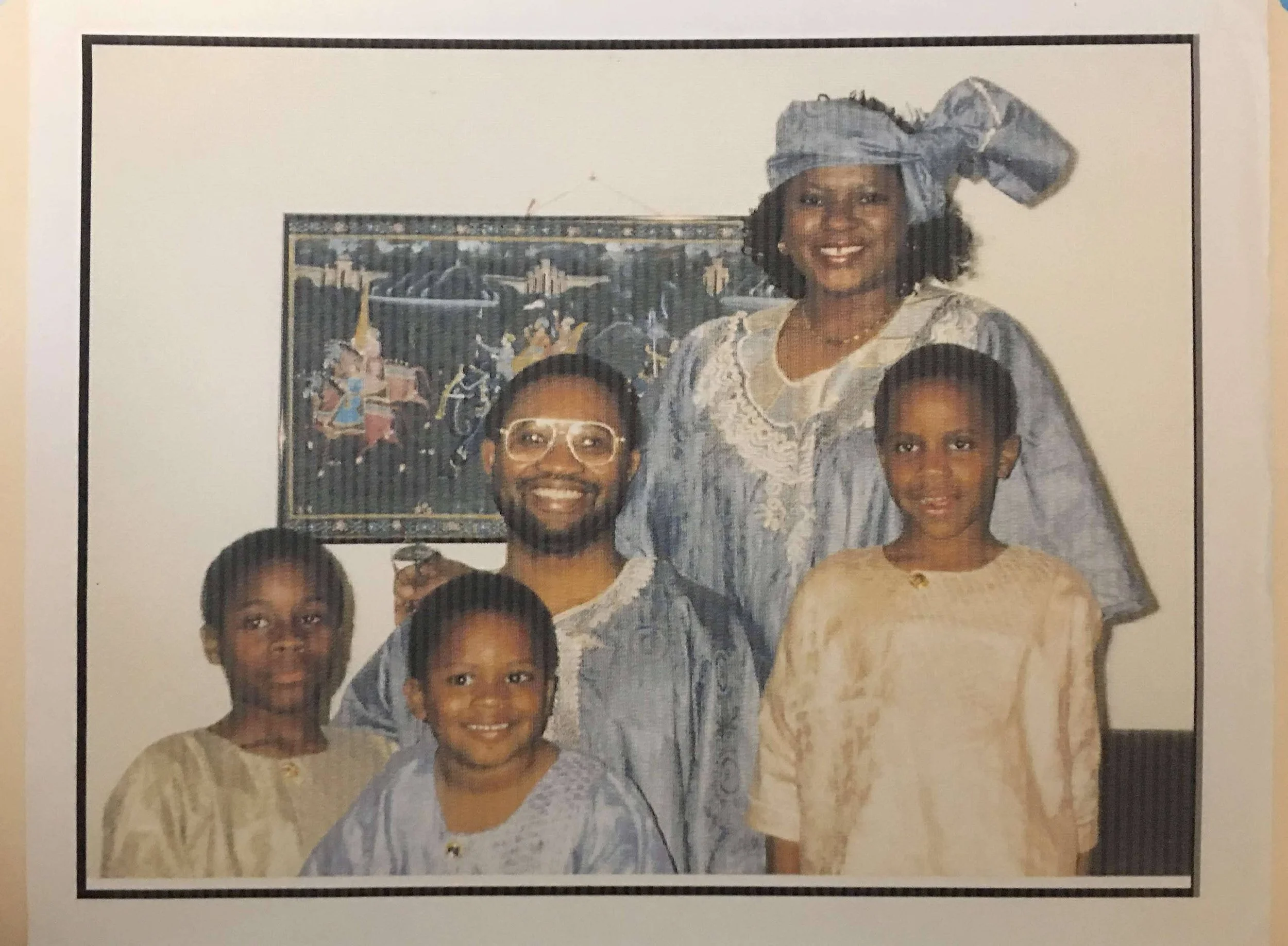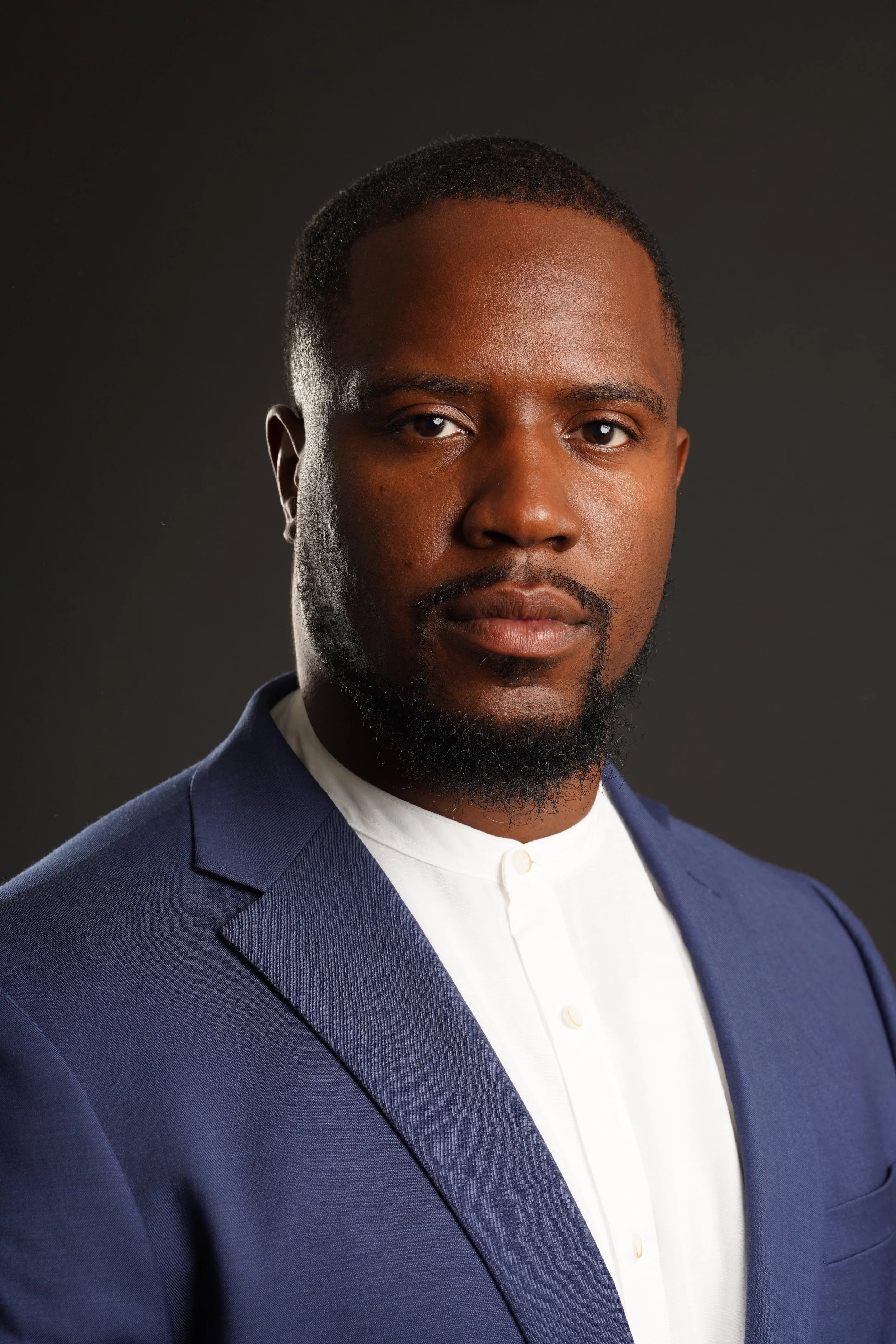Stories That Stay
Episode 2 - Osahon Tongo
Subscribe Wherever You Get Your Podcasts
About Our Guest
Osahon Tongo
Emmy Award-Winning Filmmaker, Writer, & Director
Osahon Tongo is an Emmy Award-winning filmmaker, writer, and director from Naperville, Illinois. His work spans cinematic storytelling, cultural commentary, and immersive media—always rooted in identity, legacy, and the complexity of the Black experience.
As a director and producer on the Emmy-winning documentary series NFL 360, Tongo has earned 10 Sports Emmy nominations and 2 wins. His standout works include The Indelible Legacy of Jimmy Raye, The Chief Who Walked the Sea (a four-time Emmy-nominated poetic portrait of Jim Brown and Igbo Landing), and The Flyest Ever (on the legacy of the Tuskegee Airmen). He’s also created content for the Super Bowl, NFL Combine, Draft, and more.
Tongo was 2nd Unit Director on They Cloned Tyrone (Netflix), directing the now-iconic satirical chicken commercial. A WGA member, he’s written for
BET’s Birth of Cool and co-written features for Rabbit Bandini and Significant Productions. His short films have screened at Cannes, The Getty, and international festivals.
He also served as cinematographer for Question Bridge (Smithsonian) and produced Greenwood Avenue VR for YouTube VR.
A USC MFA alum and former Georgia Tech football player, Tongo is a Ryan Murphy Directing Fellow, Annenberg Fellow, and committed community mentor in Los Angeles.
About Our Hosts
Shamm Petros, Senior Director of Learning & Development at Lion’s Story, brings training grounded in the organization’s 35+ years of racial literacy research and a story-forward approach to racial healing.
Dwight Dunston, a mindfulness practitioner and storyteller, provides the emotional grounding and reflective prompts that model racial stress processing through the body.
Full Episode Transcript
Opening & Introduction
Shamm H. Petros (00:05)
Welcome to Stories That Stay: How the Stories of Identity Shape Us. This is a podcast where healing happens at the intersection of art, science, and storytelling. I'm Shamm Petros, a therapist, learning strategist, refugee, and reluctant creative.
Dwight Dunston (00:23)
And I'm Dwight Dunston, a facilitator, educator, artist, and proud uncle. Stories That Stay is a project of Lion’s Story.
Shamm H. Petros (00:34)
Together, at Lion’s Story—an organization grounded in over 35 years of research in psychology, racial socialization, and human development—Dwight and I have spent the last five years training thousands of people to confront identity-based stress and transform their stories into tools for healing and change.
Dwight Dunston (00:56)
Whether you're an educator, organizer, artist, or someone simply trying to make sense of what you've been feeling in the world around you, you're in the right place.
Narration:
Osahon Tongo is an Emmy Award–winning filmmaker, writer, and director from Naperville, Illinois. His work spans cinematic storytelling, cultural commentary, and immersive media—always rooted in identity, legacy, and the complexity of the Black experience.
As a director and producer on the Emmy-winning documentary series NFL 360, Tongo has earned ten nominations and two wins. His standout work includes The Indelible Legacy of Jimmy Raye, The Chief Who Walked the Sea, and The Flyest Ever. He’s also created content for the Super Bowl, the NFL Combine and Draft, and more.
Tongo was second unit director on They Cloned Tyrone, now streaming on Netflix, directing the now iconic satirical chicken commercial. A WGA member, he’s written for BET’s Birth of Cool, and his short films have screened at Cannes and other international festivals. A USC MFA alum and former Georgia Tech football player, Tongo is a Ryan Murphy directing fellow and a committed community member located in Los Angeles.
As we arrive with today’s guest and his stories, we first want to prepare ourselves for the feelings, emotions, and truths that will emerge. And so, we want to take a moment to settle in together. Wherever you are, we invite you to take a few breaths just for you. Inhale. Exhale. Inhale. And exhale.
Dwight Dunston:
Osahon, welcome—welcome, welcome—to our show.
Osahon Tongo (03:10)
Thank you, thanks for having me.
Osahon’s First Story: French Toast at Daycare
Dwight Dunston (03:12)
One way we like to start the podcast is by asking how you’re arriving today. And also, we love asking folks to think about a scale from one to ten—a lot on this show and in this work. So, how you’re arriving, and then, on a scale from one to ten, how are you feeling about sharing your story today? With one being not stressed at all, and ten being like, okay, I might have used a few extra breaths because I’m feeling a little bit stressed.
Osahon Tongo (03:37)
Amen. Yeah, I’m arriving… kind of just woke up, so I’m at like two. I don’t have the time to be stressed. It is what it is. Y’all are making a safe space for me to talk, and I appreciate that. I’m kind of an open book anyway—for better and worse.
Dwight Dunston (04:03)
Appreciate that, and I’m gonna pass it over to my dear friend and co-host to take us through the next part of our time together. So grateful that you’ve joined us.
Shamm H. Petros (04:13)
Yes, thank you, Osahon. We love it—and we’re about to really feel it, I think. Based on your bio and what we know about you, what got you to this space—you are no stranger to storytelling.
Here at Lion’s Story, we base our work around the science of it—studying how we’re socialized to accept some stories about our identity and ourselves, and even socialized to carry out some behaviors. Most of our research is around identity—primarily race, but also gender and social class. We see storytelling as both art and science, because there’s a lot of data in it that we can really extrapolate, as well as finding the poetry in it over time.
Our work is really around skills. So, even meeting with you—a storytelling architect of many regards—we hope you might pick up a couple of skills too. And for us, we always start with our first story. Our first story is really asking you to go back into your earliest memory of difference.
Osahon Tongo (05:34)
You know what—I think my earliest memory... I moved a little bit. I was born in married student housing in West Lafayette, Indiana. When I was two, I moved to Naperville, Illinois, and then I moved again and again. Probably one of my earliest memories is at daycare.
I’d be in daycare and we’re playing around. It wasn’t about race so much, but most of the girls in my class were white—and I thought, because their hair was down, that they didn’t have ears. We would watch The Little Mermaid, and she never had her hair pinned back. I thought, “These girls don’t have ears. My mom has ears. Maybe you gotta grow up to get ears.”
Then I remember being on the playground. We wouldn’t stop recess until someone got hurt—it happened every day. And then there’s this picture I remember—my dad would make French toast every morning before dropping us off and going to work. I remember one morning, he dropped us off, and the food they had at daycare was terrible. I started bawling, crying, because it was so bad.
They had to call my dad to come back. He came back from work, made French toast, brought it to school, cut it up, and sat there with me so I could eat it. I just remember finally feeling calm. It’s one of those things—maybe cultural—the way my dad put love into it, how it was always hot off the skillet. That was how I was receiving love.
Reflections on Feelings and the Body
Shamm H. Petros (08:30)
Can you name every feeling you’re feeling as you reflect on that memory?
Osahon Tongo (09:09)
I’d say silliness, naivete, innocence, beauty, gratitude for my dad… scaredness, frustration, and comfort.
Shamm H. Petros (12:10)
Is there anywhere in your body you feel any of these emotions?
Osahon Tongo (12:10)
I carry stress in my lower back mostly. When I feel better—stronger, like more positive emotions—I carry them usually in my heart center. Usually, my shoulders will relax and come down. That’s a function of breath, because we brace ourselves and hold breath. When we let go, it’s free to move through the body.
Fatherhood, Care, and Legacy
Osahon Tongo (18:32)
My dad’s a man of very few words. He just shows up. When I had knee surgery, he cooked for me every day—protein-rich food, making sure I was cared for. That kind of nurturing—that’s the essence of the story.
Osahon Tongo (28:36)
My dad’s been dealing with some health issues. Seeing him mortal—every slight tear in his cape rocks me a little bit. It makes me think, “Is this world going to be rocked? How will I cope? What does this mean for the bedrock of our family? Will I be able to step into the patriarch role?”
As that pillar gets wobbly, you sit there thinking, “Is this dream going to die? Do I need to pivot?” The pressure’s on—to make it, to hold things together.
Closing & Mindful Moment
Osahon Tongo (38:22)
I feel confidence that divine consciousness is working through and for us. The fear can be a motivator—it’s energy that can move and be reshaped.
Shamm H. Petros (41:09)
Can you scale your stress level again, now that you’ve told your story?
Osahon Tongo (41:09)
Probably two.
Dwight Dunston (41:19)
Let’s close with a little breathwork.
Osahon Tongo (41:33)
Box breath is probably the best thing for the parasympathetic nervous system. In… two, three, four. Hold… two, three, four. Out… two, three, four. Hold.
Shamm H. Petros (42:31)
Thank you so much for tuning in to Stories That Stay: How Stories of Identity Shape Us. This podcast is a project of Lion’s Story.
Dwight Dunston (42:54)
Until next time—keep listening, keep learning, and please keep telling your story. And remember: you are your most important listener.
Learn More & Resources
Visit Lion’s Story to explore our mission, training programs, and upcoming events like the
Resilience Literacy Institute.
Osahon’s website: https://www.osahontongo.com/
NFL360 — The Chief Who Walked the Sea: https://www.nfl.com/videos/nfl-360-the-chief-who-walked-the-sea
NFL360 — The Flyest Ever: https://www.nfl.com/videos/nfl-360-the-flyest-ever
NFL360 — The Indelible Legacy of Jimmy Raye (stream): https://tubitv.com/tv-shows/200001509/s2022-e06-the-indelible-legacy-of-jimmy-raye
They Cloned Tyrone (2nd unit—satirical chicken spot): https://www.osahontongo.com/they-cloned-tyrone
Try box breathing (how-to): https://health.clevelandclinic.org/box-breathing-benefits
Stories That Stay is a project of Lion’s Story, a nonprofit dedicated to building racial literacy through storytelling, mindfulness, and healing.
Rooted in over 35 years of research by Dr. Howard C. Stevenson at the University of Pennsylvania, our work guides individuals and institutions to reclaim their stories, reduce identity-based stress, and step into authentic inclusion—not as a checklist, but as a way of being.
Produced and edited by Peterson Toscano.
Mindful moment music by Dwight Dunston.
Music by Epidemic Sound.
Podcast site: storiesthatstay.net
Hosts: Shamm Petros and Dwight Dunston





